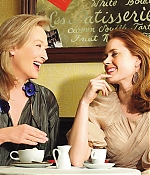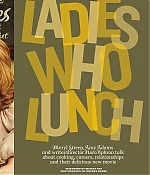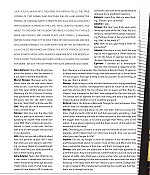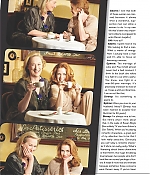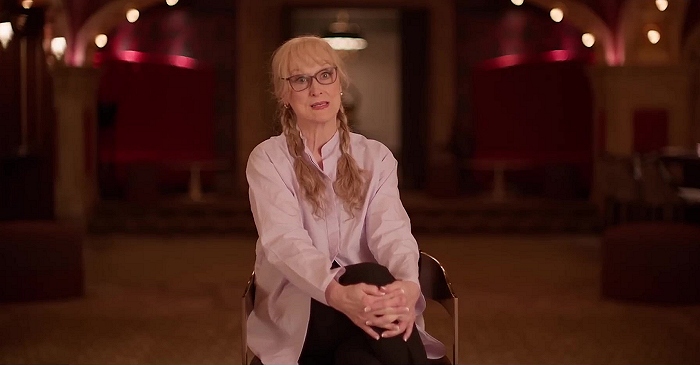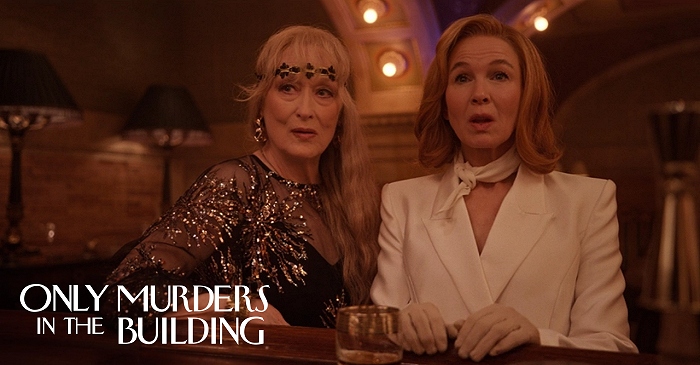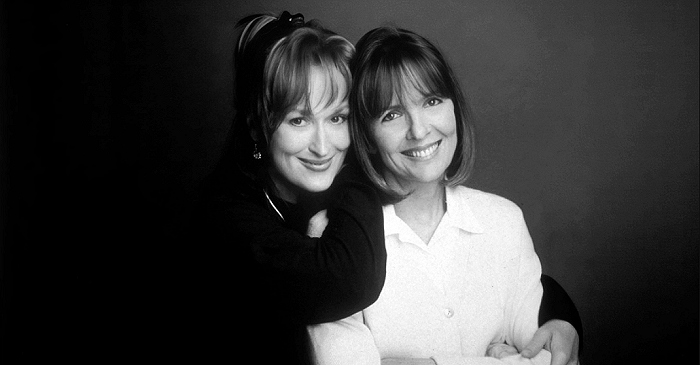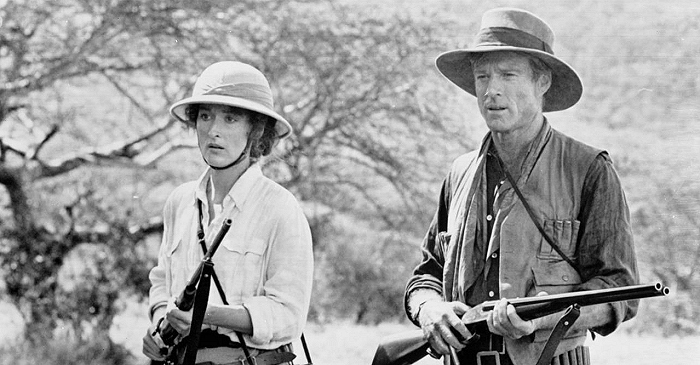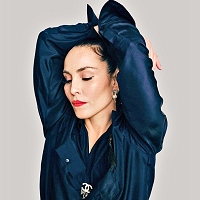|
Simply Streep is your premiere online resource on Meryl Streep's work on film, television and in the theatre - a career that has won her acclaim to be one of the world's greatest living actresses. Created in 1999, Simply Streep has built an extensive collection over the past 25 years to discover Miss Streep's body of work through thousands of photographs, articles and video clips. Enjoy your stay and check back soon.
|
|
Ladies Who Lunch
Ladies' Home Journal ·
August 2009
· Written by Marisa Fox
| ||
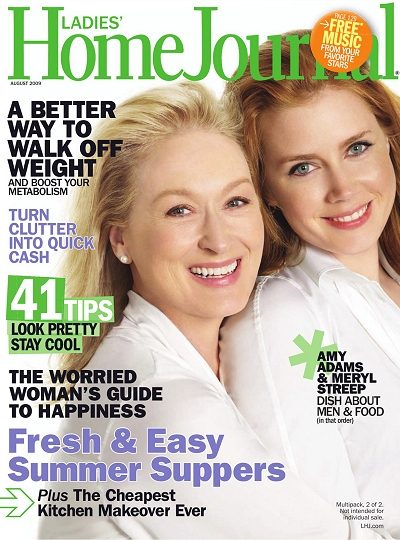
Julie & Julia, which hits theaters this month, tells the true stories of two women who discover the job – and redemptive power – of cooking. Meryl Streep plays Julia Child, living with her husband in Paris in the late 1940s, slightly bored, and about to uncover the passion for French cuisine that would make her famous. Amy Adams plays Julie Powell, a wannabe writer in New York City in 2002. Tired of her dead-end job, she challenges herself to cook every one of the 524 recipes in Julia Child’s renowned Mastering the Art of French Cooking. Nora Ephron wove both women’s memoirs into a screenplay that’s funny, touching, and quite literally leaves you hungry for more. We got the dish from the film’s director and stars.
Nora Ephron: One of the things I love about this movie is that the women in it are able to reinvent themselves.
Meryl Streep: Because we’re less about what we do and more about what we are. I can never get over the fact that Julia Child’s famous book, Mastering the Art of French Cooking, was published when she was almost 50 years old. So she didn’t really become “Julia Child” until she was 50.
LHJ: Why do you think reinvention is such a female thing?
Streep: Men buy into the idea that there is a path up to success. I think – speaking for myself – that women are more 360. We’re looking all around – behind, in front, to the side. And we take a lot of other people into account in our decisions.
LHJ: Amy, can you talk a little bit about how this pertains to your life? I read that when you were about to start filming Junebug [Adams’s breakthrough 2005 indie film], you found yourself at one of these turning points.
Amy Adams: Yeah, I did. I think for me it was when I abandoned the list of what I should do by what age because I hadn’t done most of what I was supposed to have done by 30. It made me surrender a bit more to the possibilities as opposed to my predicted trajectory.
Ephron: I read, Amy, that you were thinking, Should I give up acting?
Adams: I was.
Streep: But don’t you think each actor thinks each year of her life, Okay, this is it. What am I doing? We’re always reassessing. Putting a finger in the wind and thinking, Well, is this really it?
LHJ: How do you guys keep it fresh for yourselves?
Adams: One day at a time, that’s the only way for me to approach it. When I look too far into the future or examine too far into the past I become a crazy person.
Ephron: I started as a newspaper reporter, then I became a magazine writer, then I became a screenwriter, then I became a director. Every 10 years or so there was a moment when I’d say, even subconsciously, Is that all there is? You’ve got to find ways to keep it fresh for yourself. To do the thing, as they say, that is a stretch.
Streep: I think acting is a little too fresh because you’re trying something new every four months. Unemployment opens its mouth at the end of each job, and you think, No one will ever hire me again, and then they do. I haven’t ever managed to feel that I was equipped for the next new job. I’ve always had an appetite for each new thing and also a big dose of insecurity about whether or not it would be any good.
Ephron: Meryl, the 40s are a Bermuda Triangle for most actresses. How difficult was it to navigate that period?
Streep: What was hard about my 40s was that I had four young children. I had my fourth child at 43, and that was really something. I had some really interesting choices to make because of this new baby and the bigger kids – Louisa is 12 years younger than Henry, who is the oldest. It was about organizing and the least amount of disruption for everybody in the family.
LHJ: One thing you all seem to share with the heroines of your movie is appetite, which helped them turn their lives around. Amy, can you talk about your own hunger for life?
Adams: For me, my hunger is more for balance in my life rather than anything specifically about my career. I look at Nora and Meryl and they have a wonderful balance in their lives, and that’s my biggest goal.
Streep: Julia and Julie, our characters in the film, both have appetites of a different flavor. Amy’s character has a determination to survive and a will against all odds. Julia Child was a young woman who was six-foot-two. She was great-looking but she was outsized in her world and that was a handicap in the days when the main reason to go to Smith College was to get a husband. She transformed something that could have held her back into a strength and a joy.
Adams: I love that both of these women are married because it shows what a wonderful, supportive man can allow a woman to do. In my own life that’s been very important. [Adams is engaged to actor Darren Le Gallo.]
LHJ: How so?
Adams: I spent most of my 20s looking to find a man. What a waste of energy. Now I actually have a man and I’m able to focus on becoming a woman.
Ephron: The marriage of Julia and Paul Child almost never had a bad moment, I think. In her book she refers to a fight in a car after a party. You know, one fight in a near-50-year marriage, it’s practically irrelevant to most of us. It was a wild uncritical love. I am so not like that.
Streep: It’s something to aspire to.
Ephron: Were you nicer to your husband, Meryl? [Streep has been married to sculptor Don Gummer for 30 years.]
Streep: I’m always nice to him. But here’s what I think about that, in the wake of Susan Boyle [the unlikely TV star from Britain’s Got Talent]. When you’re playing romantic characters, a great part of my attention has to be that I look really attractive. Obviously you can’t play a romantic character if she’s not really pretty. What’s liberating about these characters is that there’s this huge throbbing love between two people who don’t look like our normal package of lovers. It made it more real and intimate because somehow those concerns were thrown away. If you’ve been married for a long time you love without looking. I don’t assess how my husband looks every single day and think, Is he cute enough or whatever? And I sure hope he doesn’t do it to me! [Laughs]
LHJ: Similarly, Amy’s character, Julie, got to spend most of the movie in sneakers and jeans. Was that liberating?
Adams: Absolutely, it’s closer to home. It was great to not have to worry about if I looked attractive or not, because that can be a little overwhelming.
LHJ: I heard for this movie you all learned how to cook.
Streep: Yeah, I got a lot of good tips. Mostly what I learned has to do with equipment and how to use it right. You need a very good pan and if you don’t have a really good pan, it’s never going to work. And always cook at a high heat. The other thing I learned was, and I’ve been cooking for hundreds of years, that if you have garlic and onions on your fingertips, if you dip your hands in salt and then rinse them in cool water, the smell goes right away.
LHJ: That’s a useful tip.
Streep: And always sharpen your knives, otherwise you can’t cook right and everything takes 10 times longer and you get really mad.
LHJ: How hard was it to nail Julia Child’s way of talking?
Streep: Nora said, “You’re not really Julia Child, you’re Julie’s idea of Julia Child.” So that gave me the freedom to not replicate her so much as to try to find the particular spirit that I kept reading about.
Ephron: One of her friends said that she was like a Christmas tree. She was joyful.
Streep: In a way, it was a perfect moment to pay tribute to my mother, who was sort of that person in my life. She was somebody who turned the lights on when she came into a room. I have a much more reserved side. But I’ve always wanted to be more like her, so playing Julia gave me the chance.
LHJ: Okay, so how much weight did you all put on making this movie?
Streep: I gained 15 pounds. I’m still trying to lose it. It was worth it.
LHJ: What about you, Amy?
Adams: I was very grateful that my character wasn’t about her physique. Let’s just put it that way.
Ephron: But you didn’t gain a whole lot of weight did you?
Adams: No, but I ate a lot.
Ephron: Well that’s one of the things that I said in rehearsal – everyone had to eat in the scenes. These actors just really went for it.
Streep: I wanted to ask Nora, after you finished the movie and saw it all put together, was there anything that surprised you about it that you didn’t know?
Ephron: I always thought that this was going to be a movie about marriage. But I didn’t really know that until I got into the cutting room. That’s one of the things I like so much about it because you just do not see any movies about marriage. You see movies about people who fall in love or fall out of love, but mostly fall in love, and then the movie ends when they say “Will you marry me?” That thing, that quotidian thing about marriage that we all love so much, the “what’s for dinner?” of it, that to me was something that I was really happy with when it was over.
LHJ: What specifically appealed to you about your role, Meryl?
Streep: As Nora said, movies are usually about a marriage that somebody’s trying to break out of or can’t find, never about the sustenance, like food, that a marriage provides you.
LHJ: And Amy, how did it affect you? I know that you’re engaged.
Ephron: She would never be engaged but for this movie. [Laughter]
Adams: Yeah, I got engaged on this film – the day before I finished shooting. Maybe this is a very, I don’t know, young girl statement, but when you’re not seeking to gain the approval of your man, it’s amazing what you can accomplish. And that’s what I’ve learned from my fiance – he accepted me from day one as I was, which allowed me to discover who I was meant to be. I’m very appreciative of that.
LHJ: In the film, Julie receives pearls from her husband. Is your engagement ring your pearls?
Adams: It’s funny because the engagement ring is not…it’s beautiful, but it’s the smaller gifts that led up to the engagement ring that mean a lot. He’s written me letters when I’m on sets and drawn me pictures. He’s made me paintings. It’s the stuff that didn’t cost anything except for time and thought.
Ephron: My husband [screenwriter Nicholas Pileggi, who wrote Goodfellas], used to bring the silliest things home to me, like a bag of subway tokens because I was always losing them in my purse. It was so romantic.
Adams: When my fiance puts gas in the car and I get in the car and there’s a full tank of gas, it’s awesome.
Streep: It’s all those little considerations. Warming the car up, that’s a big one for me.
LHJ: Julia’s prescription to eat well and enjoy life is so simple and delicious. If you had to condense your philosophy into a simple dictum, what would it be?
Ephron: To me fun is everything and I’m always sad when I meet people who don’t have what my sister calls “the fun gene.” The older you get the more crucial it is to think about, how can I have the most fun out of this day, the most delicious food, be with the people I really want to be with.
Adams: There was a greeting card I read that said “Cooking is like love, it should be approached with abandon.”
LHJ: Which brings me to…what are your favorite Julia Child recipes?
Streep: Tarragon roast chicken is a foolproof recipe and also something that everybody loves.
Adams: I recommend the brussels sprouts with butter and cheese.
Ephron: And I have too many to name.
LHJ: Bon appetit!


Posted on October 18th, 2025
|
Posted on October 14th, 2025
|
Posted on October 11th, 2025
|
Posted on September 30th, 2025
|
Posted on September 16th, 2025
|




